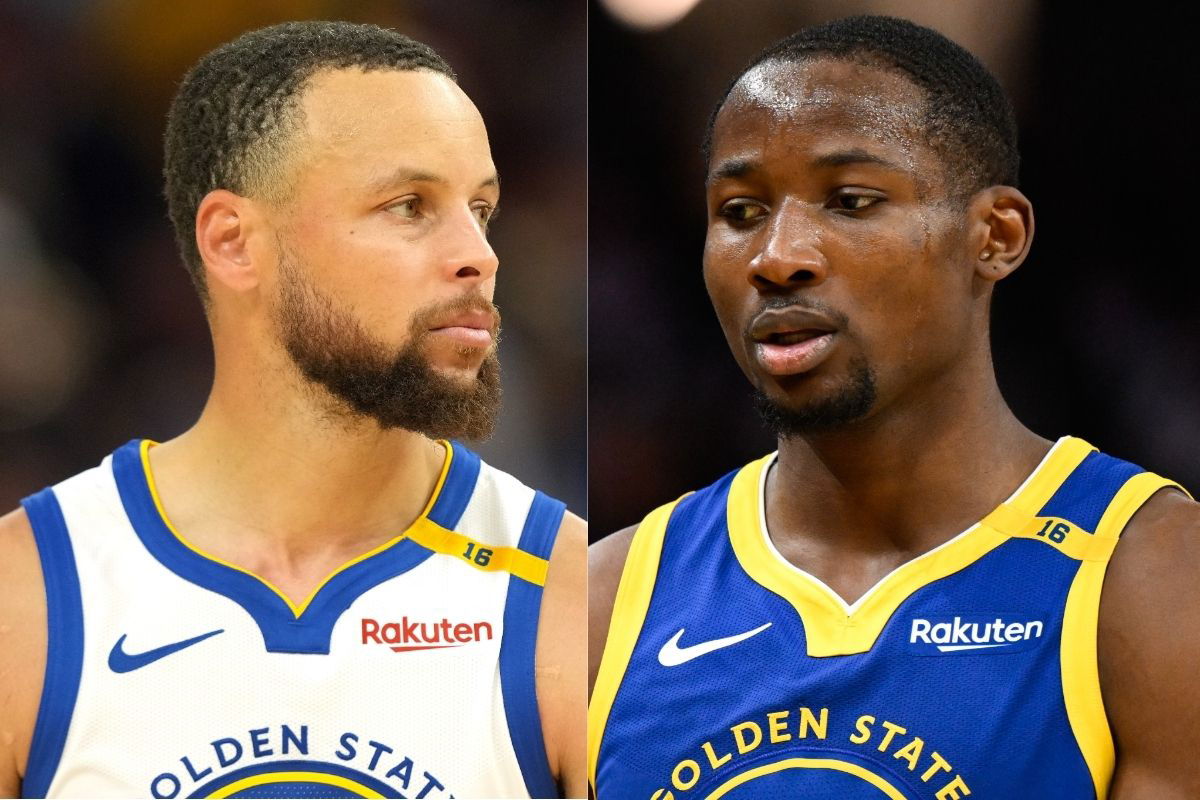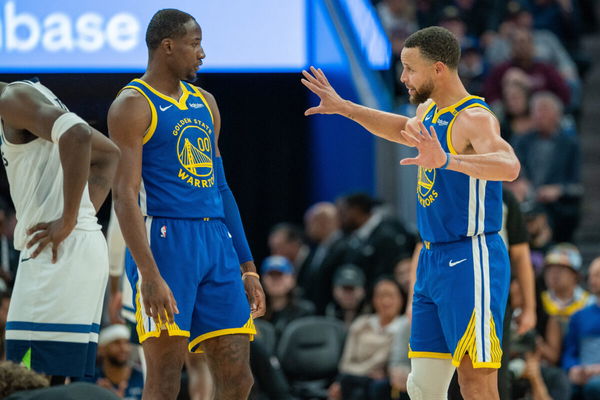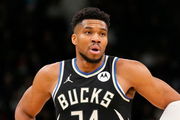
Imago
Via Imagn

Imago
Via Imagn
Jonathan Kuminga’s contract standoff with the Golden State Warriors has dragged through the offseason without a resolution. The 22-year-old forward and his agent, Aaron Turner, have pushed for a player option to be included in any long-term deal. The Warriors, meanwhile, have countered with offers built around team options instead. A reported three-year, $75 million proposal with the final year under team control remains the centerpiece of talks, but Kuminga’s camp has insisted that flexibility at the back end of the contract is non-negotiable.
Turner has explained that “if you want a team option and you want to get rid of his no-trade clause, which the QO inherently has, okay, that’s a different price”. This standoff has been sharpened by the timing of free agency, with the market for restricted players weaker than expected. Golden State is operating under a punishing new collective bargaining agreement that makes every decision financially sensitive, leaving little room for compromise. Now, an ESPN insider has revealed why the Warriors have remained firm in refusing Kuminga’s demand.
NBA on ESPN released a video where Brian Windhorst detailed the franchise’s reasoning, highlighting the precedent set by their own stars. “And they can look you in the eye and say, ‘Hey, we don’t want to do a player option because we didn’t give one to Steph. We didn’t give one to Jimmy Butler last year,’” Windhorst explained. He went on to clarify that Draymond Green’s player option came only after taking a pay cut and restructuring his deal. “If Steph doesn’t get one, you don’t be able to get one. I’m not saying I agree with that. I’m just saying what they could say.” Windhorst added that the Warriors are also structuring contracts with an eye on making them tradable, not just for financial relief but as potential assets.
ADVERTISEMENT
Of course, there is more to unpack here. JK is not Stephen Curry or Jimmy Butler, and the Warriors have no intention of actually making him a centerpiece. Instead, all signs point to the fact that they want the highest possible value when they eventually do manage to move him. Further, while the market for free agents may be weak as of now, things are set to change in the coming offseason. That means that the qualifying offer may still be the most plausible solution as far as the player is concerned as that is the only scenario which allows him to re-sign with control over his future.

Imago
Dec 6, 2024; San Francisco, California, USA; Golden State Warriors guard Stephen Curry (30) speaks with forward Jonathan Kuminga (00) during a time out against the Minnesota Timberwolves during the fourth quarter at Chase Center. Mandatory Credit: Neville E. Guard-Imagn Images
Stephen Curry’s most recent extension, a one-year $62.6 million agreement, was offered without a player option. Butler’s two-year, $121 million extension also came without that privilege. Green, the lone exception, reduced his annual salary from $27.6 million to $22.3 million in the first year of his four-year, $100 million deal, saving the team millions in luxury tax penalties. Even Andrew Wiggins, who secured a player option on his four-year $109 million extension, only did so after cutting his salary by nearly $10 million per year. In this context, Kuminga’s request for a player option without financial concessions stands at odds with the franchise’s established model.
ADVERTISEMENT
The Warriors’ hesitation is also tied to the league’s restrictive salary cap rules. Sitting $6.1 million above the luxury tax line and facing a projected $15.4 million penalty, the franchise is fighting to avoid long-term repeater tax consequences. Contracts structured with team control offer not just financial breathing room but greater trade flexibility. As Windhorst outlined, “I think they’re working hard because they want to get a contract that’s as tradable as possible.” With Kuminga entering restricted free agency, his base year compensation complicates sign-and-trade possibilities, making a clean and controllable deal crucial for front office planning.
For Kuminga, this creates a unique dilemma. He is being asked to sacrifice not only playing time behind veterans but also future flexibility in exchange for security. His camp has argued that the qualifying offer, valued at $7.9 million, remains a serious option if the Warriors refuse to meet their demand. Yet, the influence of veterans adds another wrinkle. Reports indicate that Stephen Curry, Draymond Green, and Jimmy Butler have voiced support for Kuminga’s long-term stay, hoping the front office finds common ground. Whether that advocacy shifts negotiations remains to be seen, but the standoff has already spotlighted how much Curry’s contract history weighs on the discussion. And that tension will only grow as the October 1st deadline to accept the qualifying offer approaches.
ADVERTISEMENT
Top Stories
Lakers Reporter Drops Luka Doncic Injury Update After Injury Exit vs 76ers

“Hated Kristaps Porzingis on Our Team”: NBA Legend Gets Brutally Honest After Warriors’ Jonathan Kuminga Trade

“I’m Sorry”: Steve Kerr Makes Emotional Confession After Jonathan Kuminga Trade

Lakers, Warriors Get Their Wish as Bucks Announce Giannis Antetokounmpo Trade Decision

“Doesn’t Happen Without Steph Curry”: Steve Kerr Credits Warriors Star for Caitlin Clark’s Fandom

Jonathan Kuminga has every right to hold his ground
Veteran voices have entered the negotiation and that has amplified the stakes for the front office because Stephen Curry Draymond Green and Jimmy Butler reportedly back keeping Kuminga in the long term. Reporters have cited sources who say those veterans view Kuminga as important to the franchise window and are asking management to do what it takes to keep him in Golden State. The players argument is simple they see upside and want the team to invest in the young forward rather than let him walk or linger on uncertain terms.

Imago
Credit: IMAGN IMAGES
Turner has been explicit about why a player option matters for Kuminga and how the Warriors would need to compensate for giving him that flexibility. As Aaron Turner put it “If it’s about really controlling the back end of the deal, move the number up, shake your roster up and you can have a team option. Or if you want to keep him, you’ll have his bird rights (even if you give him a player option).” That framing turns the demand into a bargaining chip not an ultimatum, and ties directly into the Warriors need to manage luxury tax and apron rules.
ADVERTISEMENT
The roster and cap context is tight. The Warriors sit millions above the tax line and face penalties that limit free agent tools and trades, so contracts with team control offer both cost predictability and easier trade uses. Windhorst and other analysts have highlighted how the franchise has historically denied player options to even star players unless those stars agreed to concessions, and the Warriors say they use that history as a consistent policy. That precedent is the crux of the front office stance when weighing Kuminga against payroll and future flexibility.
For Kuminga the choice is between immediate security and long term control. The qualifying offer remains a real option and several teams have shown interest which gives his camp leverage. Whether veteran pressure shifts the front office calculus will be clear in the coming weeks. However, for Kuminga, the choice is simple. He has not managed to earn the trust of the coaching staff, has received no indication that he will be seen as an important part of the roster, and the Warriors’ stubbornness suggests they only want to ensure they trade him for the right value.
ADVERTISEMENT
The player himself is not merely negotiating for a paybump. He clearly wants to eventually move to a franchise that values him for his basketball skills and do not merely see him as a trade asset, which means the saga may as well last continue for the time being.
ADVERTISEMENT
ADVERTISEMENT
ADVERTISEMENT